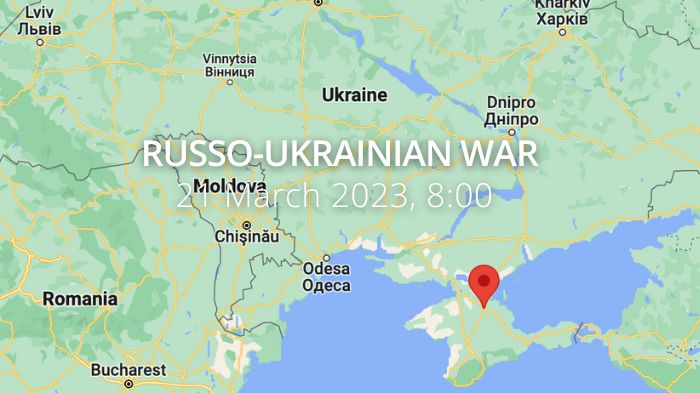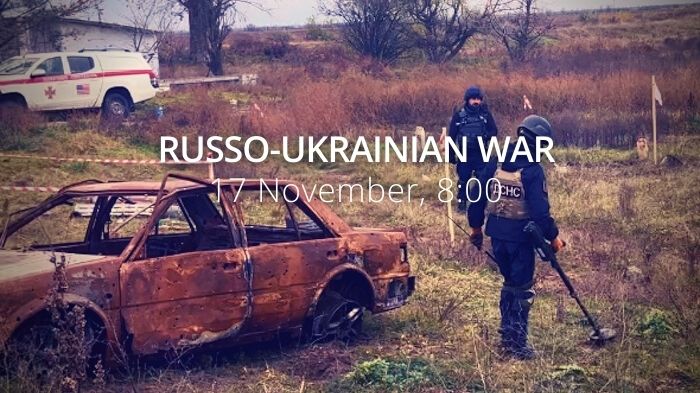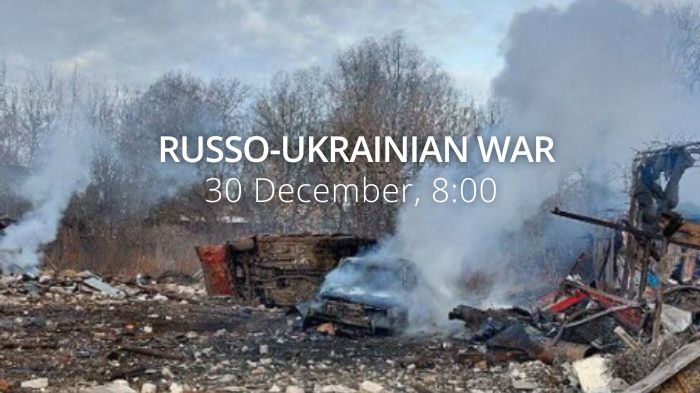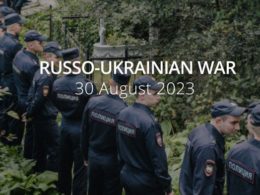Blasts in Dzankoi, Crimea. Russian troops continue attempts to reach the administrative borders of Donetsk and Luhansk Oblasts. Chinese President Xi Jinping met with Russian President Vladimir Putin in Moscow.
Blasts heard in occupied Crimea
Gunfire and several explosions were reported near the town of Dzhankoi. According to local media, a Russian air defense unit shot down a drone
📹by Klymenko Time https://t.co/pmJRwU6NoL pic.twitter.com/v2iLnNc3xr— Euromaidan Press (@EuromaidanPress) March 20, 2023
Daily overview — Summary report, March 21
A map of the approximate situation on the ground in Ukraine as of 00:00 UTC 21/03/23. pic.twitter.com/D6ir6I3r3i
— War Mapper (@War_Mapper) March 21, 2023
The General Staff’s operational update regarding the Russian invasion as of 18.00 pm, March 21, 2023 is in the dropdown menu below:

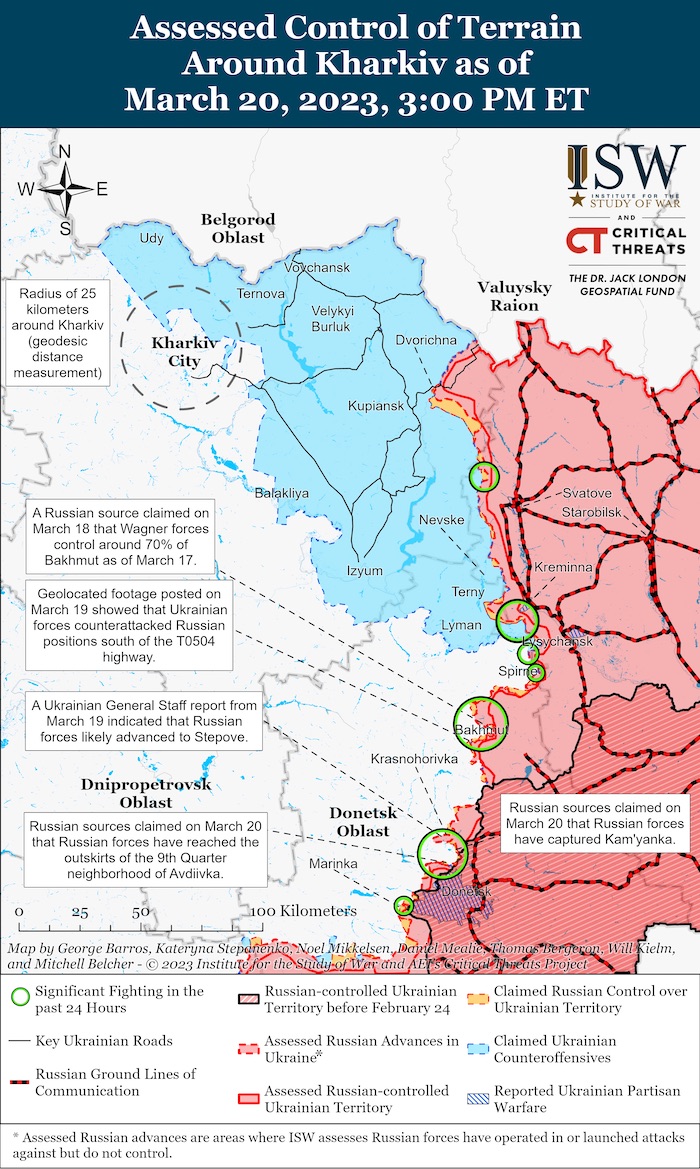
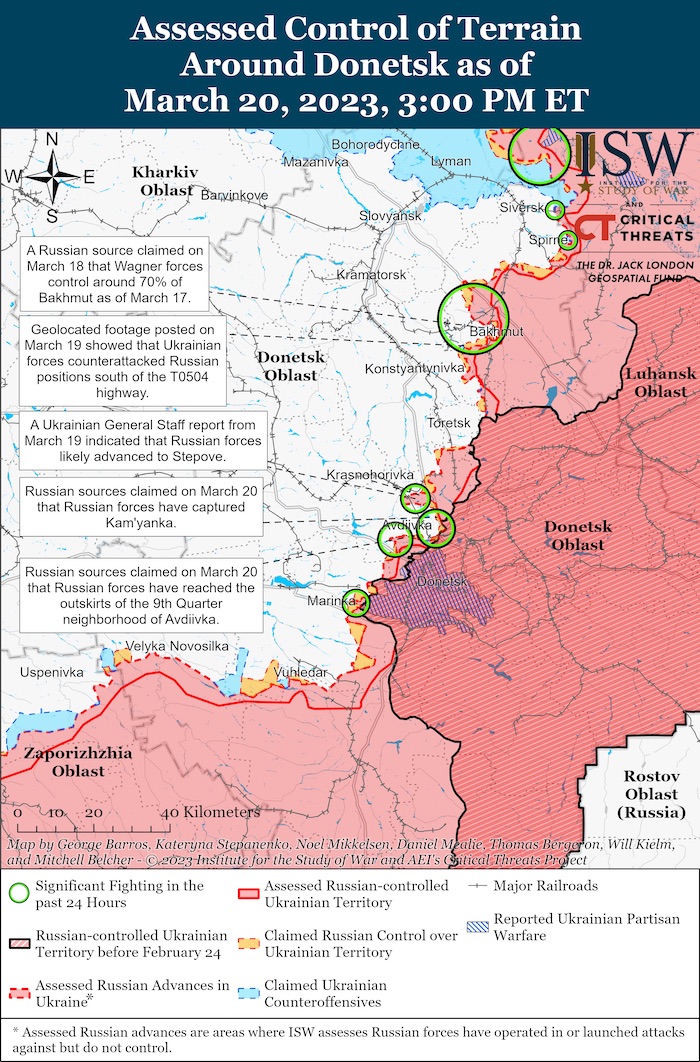
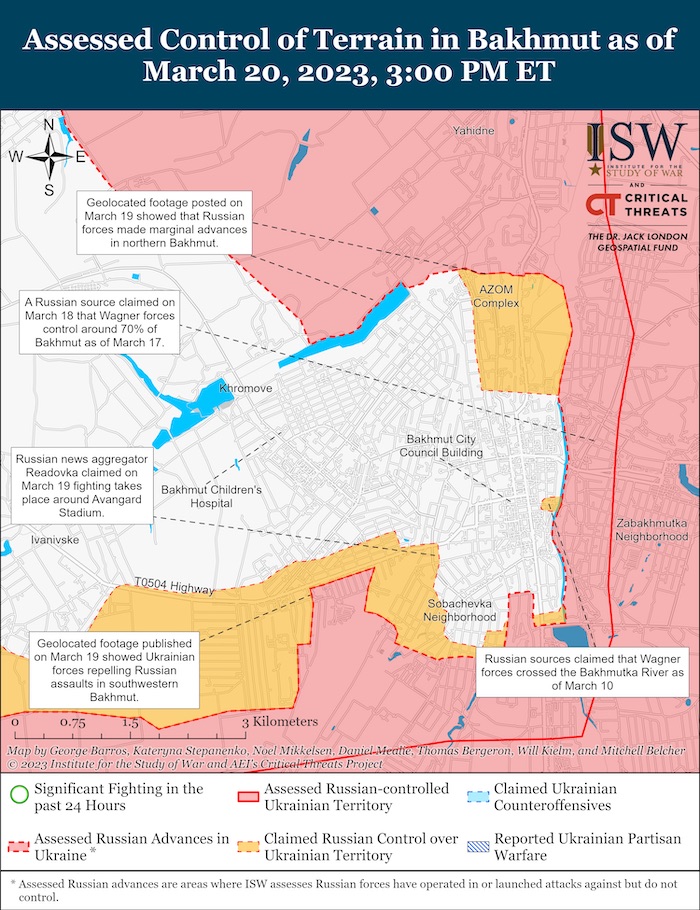
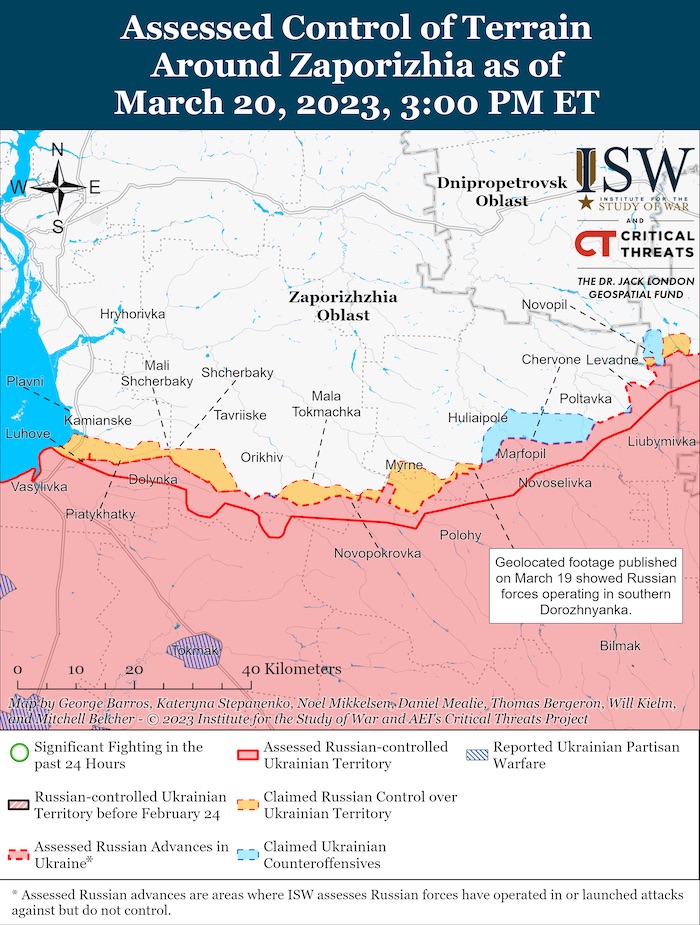
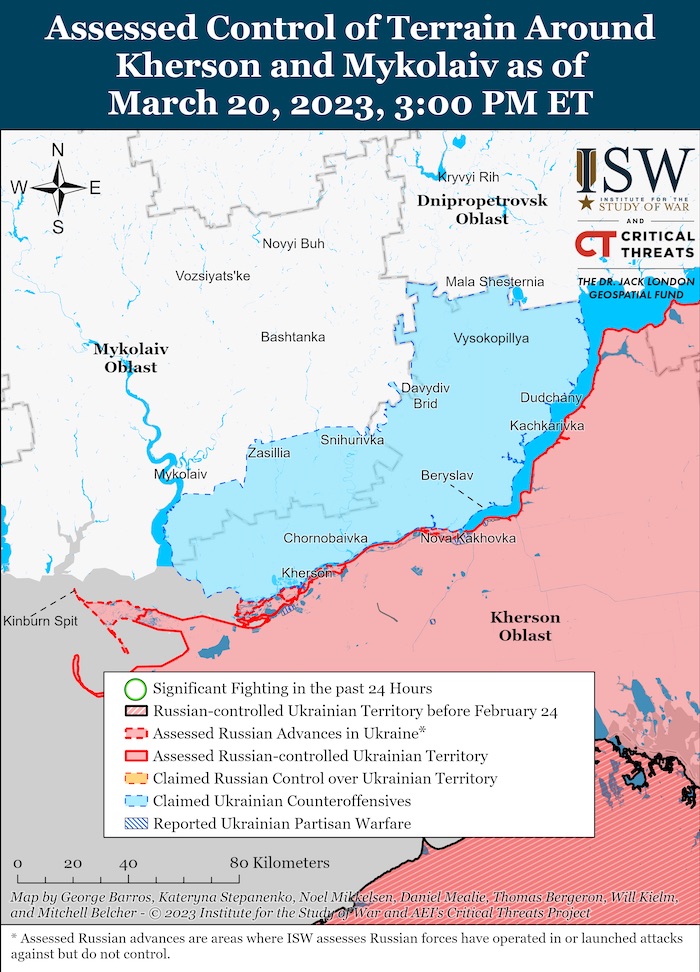
Military Updates
Russian troops shelled Zaporizhzhia Oblast 207 times over the last three days and targeted the region with missiles
3 civilians were killed and 2 injured in the attacks, Ukrainian police reportedhttps://t.co/vbpRj1d5Z9 pic.twitter.com/livjRKFOAL
— Euromaidan Press (@EuromaidanPress) March 20, 2023
Russian troops launched 207 attacks on Zaporizhzhia Oblast over three days. The Russian Army shelled Zaporizhzhia Oblast 207 times over the last three days and targeted the region with missiles, Ukrainian police reported. Three civilians were killed and two injured in the attacks as Russian projectiles hit the houses of residents of the Polohy and Vasylyv districts.
Blasts heard in occupied Crimea (updated). Gunfire and several explosions were reported near the town of Dzhankoi. According to local media, Russian air defense units shot down a drone. The Defence Intelligence of the Ministry of Defence of Ukraine has reported that Russian сruise missiles “Kalibr-NK” were destroyed in a blast in Dzhankoi city in Crimea when they were transported by rail.
Ukrainian military learn how to operate modern air defense system in Italy – Il Giornale D’Italia. Ukrainian soldiers are being trained on how to operate a modern surface-to-air defense missile system SAMP/T in Italy, the Italian newspaper Il Giornale D’Italia reported. According to Il Giornale D’Italia, 20 Ukrainian soldiers started the training near Rome (Italy) at the beginning of March 2023. The Ukrainians learn how to down ballistic missiles and other aerial targets with the help of the Italian-French air defense system SAMP/T. This system is designed to take down cruise and ballistic missiles, as well as manned and unmanned aircraft.
According to British Defence Intelligence, (last 48 hours):
- In the coming weeks, thousands of Russian convicts who have fought for Wagner Group are likely to be pardoned and released. Wagner prisoner recruitment peaked in autumn 2022, with inmates being offered commutation of their sentences after six months of service.
- Although approximately half of the prisoners recruited have likely been killed or wounded, evidence from Russia suggests the group is following through on its promise to free survivors. The certificates issued to freed Wagner veterans claim to have been endorsed by the decree of President Putin.
- With Wagner now likely banned from recruiting more prisoners, this exodus will worsen its personnel problems. In addition, the sudden influx of often violent offenders with recent and often traumatic combat experience will likely present a significant challenge for Russia’s war-time society.
Losses of the Russian army
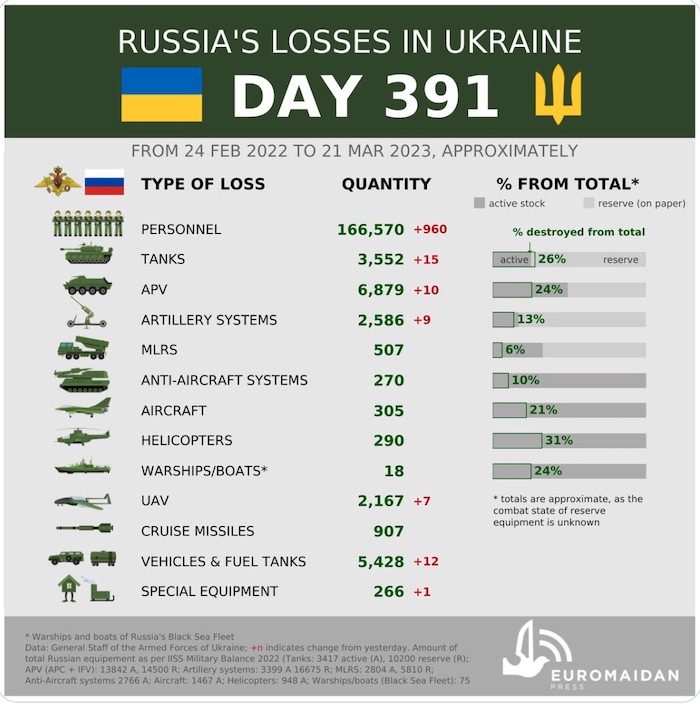
Humanitarian
A year ago, on 20 March 2022, Retroville, the shopping center in Kyiv, was destroyed by Russian missiles
At least eight people were killed in the attack. After four months of restoration works, Retroville was reopened 📷by Raketa ua https://t.co/pWMEeaadYm pic.twitter.com/qEwUcxuDiB
— Euromaidan Press (@EuromaidanPress) March 21, 2023
Ukraine evacuates all children from entire city next to Bakhmut. The Military Administration of Chasiv Yar city evacuated all kids to a safer place, far from the frontlines, according to the Head of the Military State Administration of Chasiv Yar Serhii Chaus. “There are no children in Chasiv Yar anymore. They were evacuated on 17 March. It was painful and hard, but we had to do that,” Serhii Chaus said. The evacuation was carried out by the Military Administration, local police, and volunteers, according to Chaus.
Their village is occupied by Russians, but they unite online. The Russian military occupied Vilne, in Donetsk Oblast, a year ago. The villagers who remained suffered Russian looting and betrayal of collaborators, while those who fled the war and repressions just want to go home.
Legal
If Putin comes to Germany, he will be arrested – German Justice Minister. The arrest warrant of the International Criminal Court (ICC) against Russia’s President Vladimir Putin will be executed, if Putin comes to Germany, Marco Buschmann, Germany’s Justice Minister, told Bild. “I expect that the International Criminal Court in The Hague will approach Interpol as well as the contracting states and ask them for the enforcement,” Marco Buschmann said. Germany is obliged to detain Vladimir Putin and hand him over to the ICC in the Hague if Russia’s President enters the territory of Germany, Buschmann concluded.
Army procurement scandal prompts Ukraine to boost transparency, but more needed for sustainable reform. A scandal with inflated food procurement prices in Ukraine’s Army has prompted a staff reshuffle and opening up food procurement details despite the secrecy entailed by martial law. However, it will take more to cut down money laundering in one of Ukraine’s least-reformed institutions.
Ukrainian seized in Russian-occupied Mariupol, tortured and accused of ‘terrorism’ for sharing Navalny’s surname. 25-year-old Iryna Navalna has been held in Russian-occupied Donetsk since September 2022, with her mother convinced that she has been targeted because she shares the same surname as Russia’s most prominent political prisoner. There is every reason to believe that she was tortured or threatened into providing the ‘confession’ shown on Russian state television just hours after she was seized on the street in occupied Mariupol.
#Ukraine woman seized in #Russia occupied #Mariupol, tortured and accused of ‘terrorism’ for sharing #Navalny surname #IrynaNavalna #LetMyPeopleGo #StandWithUkraine #StopRussia https://t.co/jmVsmogmOh pic.twitter.com/nkrramS24H
— Euromaidan Press (@EuromaidanPress) March 21, 2023
Support
The US announced a new military aid package for Ukraine worth $350 mn
The package includes:
🔹various types of ammunition, such as rockets for HIMARS
🔹fuel tanker trucks & riverine boats
🔹ammunition for Bradley Infantry Fighting Vehicles & howitzershttps://t.co/YVXJbZcs7o pic.twitter.com/94Z4nB6nIm— Euromaidan Press (@EuromaidanPress) March 20, 2023
US to send ammunition and tanker trucks to Ukraine – AP. On 20 March, the US State Department announced that the US would send $350 mn in military assistance to Ukraine as heavy battles with Russian troops continue for control of Donetsk Oblast. According to Secretary of State Antony Blinken, the package of aid includes:
- various types of ammunition, such as rockets for the High Mobility Artillery Rocket Systems
- an undisclosed number of fuel tanker trucks and riverine boats
- ammunition for howitzers, Bradley Infantry Fighting Vehicles, high-speed anti-radiation (HARM) missiles, and anti-tank weapons
German Marder IFVs are on the way to Ukraine – Defense Minister Pistorius. A delivery of German Marder infantry fighting vehicles is on its way to Ukraine, German Defense Minister Boris Pistorius said on the sidelines of an EU foreign and defense ministers meeting in Brussels on 20 March, CNN reports. In January, Germany announced it would provide Ukraine with 40 Marder vehicles, and later that month, Ukrainian soldiers arrived in Germany for training on the vehicles.
EU greenlights €2 billion plan to boost ammunition supplies to Ukraine. On 20 March, European Union foreign and defense ministers approved a €2 billion plan to boost ammunition deliveries to Ukraine, including through joint purchases, Euronews reported. “It is a good day, today. We have reached a political agreement to send to Ukraine 1 million shells of 155 mm,” Estonian Defense Minister Hanno Pevkur told reporters.“There are many details still to solve… If there is a will, there is a way.”
North Macedonia confirms sending Ukraine four Su-25s; Mi-24 helicopters may follow – Janes. North Macedonia has donated Sukhoi Su-25 ground attack aircraft to Ukraine, the country’s Defense Minister Slavjanka Petrovska said on 14 March, according to Janes, which confirms Janes July 2022 reports that “four non-airworthy Su-25s (three single-seat Su-25s and one twin-seat Su-25UB) were transferred.” According to the minister, North Macedonia delivered to Ukraine:
- infantry weapons and ammunition
- artillery equipment
- main battle tanks
- Sukhoi aircraft
- anti-armor and anti-aircraft weapon systems
- equipment and ammunition for use by the military aviation
Ukraine’s NATO membership “only guarantee” of deterring Russia from future aggression – Lt-Gen. Naiev. Ukraine’s Joint Forces Commander Lt-Gen, Serhii Niaev is convinced that the only guarantee of deterring Russia from future aggression is Ukraine’s accession to NATO and the constant strengthening of the Ukrainian Armed Forces. He said it in an interview with RBC-Ukraine, according to Ukrinform.
Ukrainian soldiers finished training on Samp-T anti-missile system in Italy – media. A group of around 20 Ukrainian soldiers has completed a training program in Italy, ANSA sources said on 19 March, confirming a press report. According to ANSA, Il Fatto Quotidiano reported that “the training took place at Sabaudia, in the province of Latina to the south of Rome, and regarded the Samp-T anti-missile system.”
New Developments
Ukraine is ready to fight until victory. However, some voices are now nudging the country to accept concessions on its sovereignty in exchange for peace. These “peace plans” are based on myths that must be confronted, 🇱🇹 @GLandsbergis said – Politico https://t.co/mGN3aryoZ2
— Euromaidan Press (@EuromaidanPress) March 20, 2023
Ukraine eliminates Russian collaborator who set up torture chambers in Kherson Oblast. Ukraine liquidated a Russian collaborator who set up torture chambers in Kherson Oblast during the occupation, the Main Intelligence Directorate of Ukraine’s Defense Ministry reported. Serhii Moskalenko, a Ukrainian citizen, was born in Nova Khakhovka. After Russia waged war and invaded the region, he helped to instill terror against the civilian population and was appointed a “prison warden.”
On 20 March, several European foreign ministers called for the EU to sanction oligarchs involved in “destabilization attempts” in Moldova and Georgia, amid rising fears of Russian interference.https://t.co/9tyLkxpcOG
— Euromaidan Press (@EuromaidanPress) March 21, 2023
Assessment
- On the war.
The Institute for the Study of War has made the following assessment as of March 20, 2022:
Russian forces made marginal gains in and around Bakhmut amid a reported increase in the tempo of Russian operations around Avdiivka. Russian forces likely made additional gains in southwestern and northern Bakhmut as well as northwest of Bakhmut between Bohdanivka and Khromove as of March 20.[1] The Ukrainian General Staff reported on March 19 that Russian troops attacked toward Berdychi (10km northwest of Avdiivka), which indicates that Russian forces likely advanced west of Krasnohorivka (9km north of Avdiivka) and captured Stepove (just west of Krasnohorivka).[2] Russian forces are likely increasing the tempo of operations north of Avdiivka in an effort to set conditions for the encirclement of the settlement and are reportedly employing a greater number of aviation units in the area to support these operations.[3] Avdiivka Mayor Vitaly Barabash told AFP News on March 20 that Russian forces are increasingly using Kh-59, Kh-101, Kh-555, and S-300 missiles in the Avdiivka area.[4] A Ukrainian military spokesperson stated on March 20 that Russian forces have lost about three unspecified companies (likely referring to infantry) in assaults on Avdiivka since March 19.[5] ISW previously reported that this increased tempo of Russian operations in the Avdiivka area has reportedly led to major losses and is likely a misguided effort to pull Ukrainian forces away from other areas of the front.[6] ISW has not observed Russian forces arraying substantial combat power along the outskirts of Donetsk City, and it is unlikely that Russian forces will be able to sustain this temporary increased tempo. ISW assesses that the overall Russian spring offensive is likely approaching culmination, and Russian forces may be intensifying efforts to make even marginal gains before they lose the initiative in Ukraine.[7] It remains possible that Russian advances could prompt Ukraine to withdraw from Bakhmut and/or Avdiivka although neither appears likely at this time.
Chinese President Xi Jinping met with Russian President Vladimir Putin in Moscow on March 20 and offered a more reserved vision for Russian-Chinese relations than what Putin was likely seeking. Xi and Putin touted the strength of Chinese-Russian relations in their meeting on March 20, but offered differing interpretations of the scale of future relations in articles they published on March 19.[8] Putin published an article in Chinese state media in which he argued that Russia and China are building a partnership for the formation of a multipolar world order in the face of the collective West’s seeking of domination and the United States pursuing a policy of dual containment against China and Russia.[9] Xi offered a less aggressive overarching goal for Russian-Chinese relations in his article published in Russian state media outlet Rossiskaya Gazeta, in which he noted that Russia and China are generally pursuing a multipolar world order but not specifically against an adversarial West.[10] Xi instead focused heavily on presenting China as a viable third-party mediator to the war in Ukraine whose plan for negotiations ”reflects the unity of views of the world community on overcoming the Ukrainian crisis.”[11] Putin wrote that Russia welcomes China’s willingness to ”play a constructive role in crisis management” regarding the war in Ukraine, but Putin likely was hoping for Xi to adopt a similarly aggressive rhetorical line against the West.[12]
Xi’s refusal to explicitly align China with Russia in Putin’s envisioned geopolitical conflict with the West is a notable departure from China’s declared “no limits partnership” with Russia preceding the start of the Russian invasion of Ukraine.[13] Xi’s rhetoric suggests that he is not inclined to fully give Russia the economic and political support that Russia needs to reverse setbacks in Ukraine. Putin and Xi offered somewhat similar visions for increased Chinese-Russian economic partnership, and it is likely that the two will sign bilateral trade and economic agreements during Xi’s visit, some of which will likely aim to facilitate schemes for sanctions evasion.[14] Xi will also likely offer a more concrete proposal for a negotiated settlement to the war in Ukraine, although it remains unclear what his proposal will entail and how receptive the Kremlin will be to it. The prospects of China supplying Russia with military equipment also remain unclear.
Putin is likely increasing his attempts to rhetorically rally the rest of the world against the West, although it remains unlikely that he will achieve decisive effects through this effort. Putin attended the International Parliamentary Conference “Russia-Africa in a Multipolar World” on March 20 and stated that Russia and states in Africa, Asia, the Middle East, and Latin America uphold the norms of social principles, morality, and traditions and oppose neo-colonial ideology.[15] Putin’s depiction of an envisioned Chinese-Russian axis against the West and his comments at the conference likely amount to an intensified proposal to non-aligned countries to form a defined anti-Western bloc. Putin likely hoped that Xi would offer a similar vision to augment this proposal, and Xi’s refusal to do so likely weakens the impacts of Putin’s efforts. The attractiveness of a potential anti-Western Chinese-Russian-based geopolitical bloc lies more with China’s economic and political power than with Russia’s declining economic strength and its military power badly degraded by fighting in Ukraine. Russia’s ongoing diplomatic efforts to generate support for its war in Ukraine continue to produce few tangible results, and an intensified effort to rally the rest of the world against the West will not likely be more effective.
Wagner Group Financier Yevgeny Prigozhin appears to maintain powerful political leverage and regional connections within Russia despite some officials’ attempts to distance themselves from the Wagner Group. Prigozhin claimed on March 20 that Krasnodar Krai Governor Veniamin Kondratyev personally invited a Wagner representative to Krasnodar Krai, overruled local refusals to bury Wagner mercenaries, and informed the representative that the Wagner Group will face no further obstacles burying its dead.[16] Prigozhin on March 18 claimed that authorities in Goryachiy Klyuch, Krasnodar Krai, reneged on an agreement to bury Wagner personnel.[17] A Goryachiy Klyuch official initially told a Wagner representative that Kondratyev stripped him of authority to cooperate with Wagner, which ISW assessed as an indicator of weakening connections between Prigozhin and regional officials.[18] Prigozhin’s ability to reach out to Kondratyev directly and resolve the situation suggests that his leverage in the krai remains strong. Goryachiy Klyuch officials’ initial refusal to bury Wagner mercenaries and ongoing clashes between Prigozhin and St. Petersburg officials over Wagner burials indicate that some authorities do seek to distance themselves from Wagner PMC, however. [19]
Russian authorities are likely unsure of how to redefine Wagner’s new role following Prigozhin’s overextension of Wagner resources and support. The destruction of Wagner forces near Bakhmut is likely forcing Prigozhin and Russian officials to reconsider the role of Wagner while Prigozhin works to rebuild his forces. Several news sources reported on March 20 that Russian political party “A Just Russia – for Truth” leader Sergey Mironov publicly advocated for the legalization of private military companies – such as the Wagner Group – and proposed that the Russian Ministry of Defense (MoD) take control of their oversight, which would likely be a major limitation on Prigozhin’s current freedoms as Wagner’s financier.[20] A Wagner-affiliated milblogger on March 19 accused the Russian MoD of sabotaging Wagner efforts to replenish its ranks in Ukraine with Wagner fighters from further abroad by canceling military transport flights.[21] If true, this report would suggest that the Russian MoD is attempting to prevent Wagner from regaining political leverage and rebuilding its military capabilities in Ukraine while maintaining Wagner’s role abroad. Prigozhin himself appears to be taking every opportunity to increase his media relevance and maintain the Wagner Group’s prominence in the process. Prigozhin has publicized an array of statements picking fights with local officials, amplifying disputes over Wagner burials, commenting on the expansion of Russian censorship laws, commemorating the alleged one-year anniversary of Wagner involvement in Ukraine, and more since March 18 alone.[22]
The Russian information space continues to respond to the International Criminal Court (ICC)’s issuance of arrest warrants for Russian President Vladimir Putin and Russian Commissioner on Children’s Rights Maria Lvova-Belova with ire and anxiety. Kremlin Spokesperson Dmitry Peskov claimed on March 20 that the Kremlin is “calm” about Putin’s arrest warrant and called its issuance “outrageous and unacceptable.”[23] The Russian Investigative Committee, however, opened a criminal case against ICC Prosecutor Karim Khan and several ICC judges on March 20, indicating that Russian leadership feels the need to posture proactively in its response to the ICC despite promises that the arrest warrants are meaningless in the eyes of the Russian government.[24] Russian Security Council Deputy Head Dmitry Medvedev relatedly threatened a missile strike against the ICC and suggested that ”it is quite possible to imagine the point of application of a hypersonic missile carrier from the North Sea from a Russian ship to the Hague courthouse.”[25] Medvedev has notably made continuous inflammatory and escalated threats against the collective West, and his threats should not be taken as more than aggressive informational posturing on the part of the Kremlin.[26] The range of ostensibly diverging Russian responses to the ICC arrest warrants suggests that this event will likely remain a point of neuralgia in the Russian information space and will likely lead to continued legislative and informational responses.
Ukrainian Main Intelligence Directorate (GUR) Spokesperson Andriy Yusov stated on March 20 that the frequency of large Russian missile attacks has decreased. Yusov stated that Russia does not have many Kalibr, Iskander, and Kinzhal missiles left, but still has many S-300 surface-to-air missiles.[27] ISW previously assessed that Russian forces continue to deplete their missile arsenal and may constrain how often and at what scale to conduct missile strikes but will likely continue to threaten Ukrainian critical infrastructure and civilians.[28]
Russia requested that the UN Security Council discuss Israeli airstrikes in Syria possibly in retaliation for Israel’s approval of export licenses for anti-drone jamming systems for Ukraine. Israeli news outlet The Times of Israel reported on March 18 that Russia’s UN representative told the UN Security Council that Israel’s airstrikes in Syria must stop.[29] An Israeli official claimed that Israel had not expected Russia to call for the discussion and feared that Russia would promote a resolution against Israel. Russia’s comments about Israeli airstrikes in Syria occurred after Israeli Foreign Minister Eli Cohen notified Ukrainian President Volodymyr Zelensky about the approval of the export licenses on Cohen’s visit to Ukraine on March 15.[30]
Key Takeaways
- Chinese President Xi Jinping met with Russian President Vladimir Putin in Moscow and offered a more reserved vision for Russian-Chinese relations than Putin likely desires.
- Putin is likely increasing his attempts to rally the rest of the world against the West, although it remains unlikely that he will achieve decisive effects in this effort.
- Wagner Group Financier Yevgeny Prigozhin appears to maintain powerful political leverage and regional connections despite some officials’ attempts to distance themselves. Russian authorities are likely unsure of how to redefine Wagner’s new role following Prigozhin’s overextension of Wagner resources and support.
- The Russian information space continues to respond to the International Criminal Court (ICC)’s issuance of arrest warrants for Russian President Vladimir Putin and Russian Commissioner on Children’s Rights Maria Lvova-Belova with ire and anxiety.
- Ukrainian Main Intelligence Directorate (GUR) Spokesperson Andriy Yusov stated that the frequency of large Russian missile attacks has decreased.
- Russia requested that the UN Security Council discuss Israeli airstrikes in Syria possibly in retaliation for Israel’s approval of export licenses for anti-drone jamming systems for Ukraine.
- Russian sources claimed that Ukrainian and Russian forces conducted offensive operations northeast of Kupiansk.
- Russian forces continued offensive operations near Svatove and Kreminna.
- Russian forces continued making advances in and around Bakhmut.
- Russian forces continued ground attacks along the Avdiivka-Donetsk City frontline and made marginal gains near Avdiivka.
- Russian sources claim that Russian forces are building up defensive fortifications and repelled Ukrainian reconnaissance-in-force operations in Zaporizhzhia Oblast.
- Russian sources accused unknown actors of planting a bomb that exploded near a gas pipeline in occupied Simferopol, Crimea.
- Russian President Vladimir Putin acknowledged Russian difficulties obtaining components for high-tech industrial production.
- Ukrainian partisans killed Russian-appointed head of the Kherson Oblast pre-detention center Serhii Moskalenko with an improvised explosive device on March 17.




